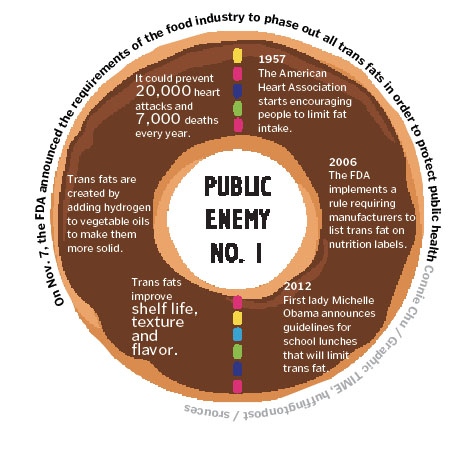If you can not imagine a world without the pizza, doughnuts and other processed foods that are omnipresent in today’s pantries and supermarkets, you might want to consider stocking up on them now. On Nov. 7, the Federal Drug Administration (FDA) announced it made a preliminary decision that trans fats are no longer recognized as safe for consumption. It will begin a 60-day period for food manufacturers to comment on their ability to phase out artificial trans fats in their products before it bans the sale of such products with trans fat additives that are not approved beforehand by the FDA.
 Trans fats, also known as partially hydrogenated oils, are mainly food additives predominantly used in order to improve the shelf-life, flavor and texture of processed foods. Trans fat was widely accepted by both medical authorities and food activists as a cheaper and healthier alternative for products with saturated fats like butter until studies in the 1990s showed it played a significant role in causing heart disease. As a result, trans fat labeling became mandatory in 2006, bringing it to the forefront of public attention and allowing consumers to make healthier choices for themselves.
Trans fats, also known as partially hydrogenated oils, are mainly food additives predominantly used in order to improve the shelf-life, flavor and texture of processed foods. Trans fat was widely accepted by both medical authorities and food activists as a cheaper and healthier alternative for products with saturated fats like butter until studies in the 1990s showed it played a significant role in causing heart disease. As a result, trans fat labeling became mandatory in 2006, bringing it to the forefront of public attention and allowing consumers to make healthier choices for themselves.
However, it may seem odd why certain foods that show they have zero grams of trans fats on their food labels may suddenly disappear once the ban comes into effect. According to Sonya Brown, Family and Consumer Science teacher, those products may actually contain considerable amount of trans fats due to a regulation loophole that allows them to hide their true levels of trans fats.
“Things like your cookies, your crackers, your frozen goods, even (some of) your canned goods will have some trans fats in them,” Brown said. “Right now, companies can claim that there are no trans fat products if (foods) have less than 0.5 grams (per serving). Even if it is that 0.5 grams, if you eat it all the time, it adds up.”
In order to avoid eating products with trans fats, Brown suggests consumers look for ingredients like partially hydrogenated vegetable oil.

However, junior Matthew DelGatto said he does not agree with the FDA’s decision to phase out products with artificial trans fats.
“I don’t think it’s the government’s place to regulate what we can eat,” DelGatto said. “Once they start with the little things, they might move on to bigger things.”
Regardless of public opinion, the FDA is obligated to protect the public health, and unless new research emerges that suggests that its preliminary ruling is mistaken, there is little that can be done to reverse this judgment.
According to Brown, this decision is the result of a wider push to reduce heart problems after the trans fat issue was identified in 1999.
“After more research and studies were done through the Centers for Disease Control, I think they have linked many more heart attacks and coronary disease to these types of foods, so that’s why they’re trying to eliminate these products,” Brown said.

































![AI in films like "The Brutalist" is convenient, but shouldn’t take priority [opinion]](https://hilite.org/wp-content/uploads/2025/02/catherine-cover-1200x471.jpg)









































![Review: “The Immortal Soul Salvage Yard:” A criminally underrated poetry collection [MUSE]](https://hilite.org/wp-content/uploads/2025/03/71cju6TvqmL._AC_UF10001000_QL80_.jpg)
![Review: "Dog Man" is Unapologetically Chaotic [MUSE]](https://hilite.org/wp-content/uploads/2025/03/dogman-1200x700.jpg)
![Review: "Ne Zha 2": The WeChat family reunion I didn’t know I needed [MUSE]](https://hilite.org/wp-content/uploads/2025/03/unnamed-4.png)
![Review in Print: Maripaz Villar brings a delightfully unique style to the world of WEBTOON [MUSE]](https://hilite.org/wp-content/uploads/2023/12/maripazcover-1200x960.jpg)
![Review: “The Sword of Kaigen” is a masterpiece [MUSE]](https://hilite.org/wp-content/uploads/2023/11/Screenshot-2023-11-26-201051.png)
![Review: Gateron Oil Kings, great linear switches, okay price [MUSE]](https://hilite.org/wp-content/uploads/2023/11/Screenshot-2023-11-26-200553.png)
![Review: “A Haunting in Venice” is a significant improvement from other Agatha Christie adaptations [MUSE]](https://hilite.org/wp-content/uploads/2023/11/e7ee2938a6d422669771bce6d8088521.jpg)
![Review: A Thanksgiving story from elementary school, still just as interesting [MUSE]](https://hilite.org/wp-content/uploads/2023/11/Screenshot-2023-11-26-195514-987x1200.png)
![Review: "When I Fly Towards You", cute, uplifting youth drama [MUSE]](https://hilite.org/wp-content/uploads/2023/09/When-I-Fly-Towards-You-Chinese-drama.png)
![Postcards from Muse: Hawaii Travel Diary [MUSE]](https://hilite.org/wp-content/uploads/2023/09/My-project-1-1200x1200.jpg)
![Review: "Ladybug & Cat Noir: The Movie," departure from original show [MUSE]](https://hilite.org/wp-content/uploads/2023/09/Ladybug__Cat_Noir_-_The_Movie_poster.jpg)
![Review in Print: "Hidden Love" is the cute, uplifting drama everyone needs [MUSE]](https://hilite.org/wp-content/uploads/2023/09/hiddenlovecover-e1693597208225-1030x1200.png)
![Review in Print: "Heartstopper" is the heartwarming queer romance we all need [MUSE]](https://hilite.org/wp-content/uploads/2023/08/museheartstoppercover-1200x654.png)





